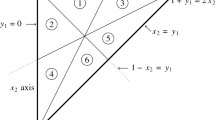Abstract
Diophantine sets, i.e. sets of positive integers A with the property that the product of any two distinct elements of A increased by 1 is a perfect square, have a vast literature, dating back to Diophantus of Alexandria. The most important result states that such sets A can have at most five elements, and there are only finitely many of them with five elements. Beside this, there are a large number of finiteness results, concerning the original problem and some of its many variants. In this paper we introduce the notion of, and prove finiteness results on so called (F, m)-Diophantine sets A, where F is a bivariate polynomial with integer coefficients, and instead of requiring \(ab+1\) to be a square for all distinct \(a,b\in A\), the numbers F(a, b) should be full m-th powers. The particular choice \(F(x,y)=xy+1\) and \(m=2\) gives back the original problem.
Similar content being viewed by others
References
Baker, A.: Bounds for the solutions of the hyperelliptic equation. Proc. Camb. Philos. Soc. 65, 439–444 (1969)
Baker, A., Davenport, H.: The equations \(3x^2 - 2 = y^2\) and \(8x^2 - 7 = z^2\). Q. J. Math. Oxford Ser. 20(2), 129–137 (1969)
Bérczes, A., Dujella, A., Hajdu, L., Luca, F.: On the size of sets whose elements have perfect power \(n\)-shifted products. Publ. Math. Debr. 79, 325–339 (2011)
Brindza, B.: On \(S\)-integral solutions of the equation \(y^m=f(x)\). Acta Math. Hung. 44, 133–139 (1984)
Bugeaud, Y., Dujella, A.: On a problem of Diophantus for higher powers. Math. Proc. Camb. Philos. Soc. 135, 1–10 (2003)
Bugeaud, Y., Gyarmati, K.: On generalizations of a problem of Diophantus. Ill. J. Math. 48, 1105–1115 (2004)
Choudhry, A.: Sextuples of integers whose sums in pairs are squares. Int. J. Number Theory. 11, 543–555 (2015)
Darmon, H., Granville, A.: On the equations \(x^p+y^q=z^r\) and \(z^m=f(x, y)\). Bull. Lond. Math. Soc. 27, 513–544 (1995)
Dujella, A.: There are only finitely many Diophantine quintuples. J. Reine Angew. Math. 566, 183–214 (2004)
Dujella, A.: Diophantine \(m\)-tuples. http://web.math.hr/~duje/dtuples.html. Accessed 17 July 2015
Guy, R.K.: Unsolved Problems in Number Theory, 3rd edn. Springer, New York (2004)
Kurosh, A.G.: Higher Algebra. Mir Publishers, Moscow (1980)
Lagrange, J.: Six entiers dont les sommes deux à deux sont des carrés. Acta Arith. 40, 91–96 (1981)
LeVeque, W.J.: On the equation \(y^m=f(x)\). Acta Arith. 9, 209–219 (1964)
Luca, F.: On shifted products which are powers. Glas. Mat. Ser. III(40), 13–20 (2005)
Schinzel, A., Tijdeman, R.: On the equation \(y^m=P(x)\). Acta Arith. 31, 199–204 (1976)
Stein, W.A. et al.: Sage Mathematics Software (Version 6.0), The Sage Development Team (2013). http://www.sagemath.org
Stewart, C.L.: On sets of integers whose shifted products are powers. J. Comb. Theory Ser. A 115, 662–673 (2008)
Szalay, L.: Algorithm to solve certain ternary quartic Diophantine equations. Turk. J. Math. 37, 733–738 (2013)
Acknowledgments
We are grateful to the Referee for the helpful comments and remarks.
Author information
Authors and Affiliations
Corresponding author
Additional information
Communicated by J. Schoißengeier.
The research was supported in part by the University of Debrecen, by the János Bolyai Scholarship of the Hungarian Academy of Sciences (A.B.) and by grants K100339 (A.B., L.H., Sz.T.), NK104208 (A.B., Sz.T.), and NK101680 (L.H.) of the Hungarian National Foundation for Scientific Research. This work was partially supported by the European Union and the European Social Fund through project Supercomputer, the national virtual lab (Grant No.: TAMOP-4.2.2.C-11/1/KONV-2012-0010). The paper was also supported by the TÁMOP-4.2.2.C-11/1/KONV-2012-0001 project. The project has been supported by the European Union, co-financed by the European Social Fund. A.D. has been supported by Croatian Science Foundation under the project no. 6422.
Rights and permissions
About this article
Cite this article
Bérczes, A., Dujella, A., Hajdu, L. et al. Finiteness results for F-Diophantine sets. Monatsh Math 180, 469–484 (2016). https://doi.org/10.1007/s00605-015-0824-6
Received:
Accepted:
Published:
Issue Date:
DOI: https://doi.org/10.1007/s00605-015-0824-6



